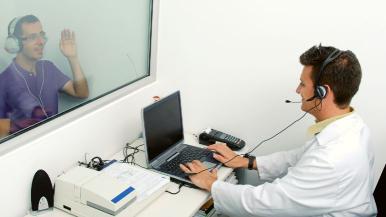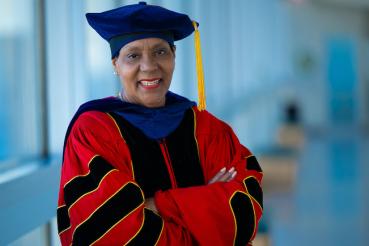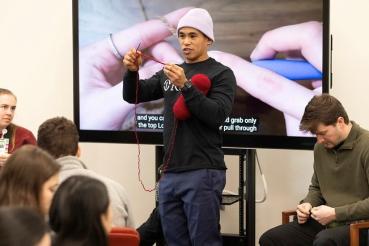What Are Your Career Opportunities With a Degree in Audiology?
The drumbeat for the audiology profession continues to get louder.
Audiology is a dynamic and evolving field that gives people opportunities to have a positive effect on peoples’ lives. And there are many different audiology career options to pursue.
“Every day is fulfilling in one way or another,” says Amy Winston, AuD, director of the Doctor of Audiology program at Rush. “I love to teach in the classroom, and I love clinical practice and teaching students in a clinical setting. My career is a beautiful marriage of so many different things. That’s the type of fulfillment the profession can give you.”
What is a Doctor of Audiology degree?
A Doctor of Audiology, or AuD degree is granted to students who have completed the classroom and clinical training required to gain mastery of the profession’s wide scope of practice. The AuD is the entry-level degree required to work in the audiology profession.
Why choose a career in audiology?
There is a growing demand for audiologists, and the profession is ranked No. 22 on U.S. News & World Report’s 2022 Best Health Care Jobs list.
In May 2020, the median annual wage for audiologists was $81,030, according to the U.S. Bureau of Labor Statistics. And audiologists in the highest 25% of the pay scale make well over $100,000 (U.S. News & World Report).
Audiologists gain a sense of accomplishment and satisfaction from their jobs in a variety of ways:
- Opportunities to improve patients’ quality of life
- Rapidly changing technology and approaches to diagnosis and treatment
- Variety of work settings
- Wide variety of career options
- Varied patient populations, from newborns to older adults
Where can a doctor of audiology work?
There is a whole host of
“Audiology students are exposed to many different settings and types of practice in audiology,” Winston says. “By the time they’re participating in full-time clinical externships at the end of the program, the majority of students will have identified the type of setting they would like to work in.”
The following are just a few of the many types of settings in which audiologists are employed:
- Academic medical centers
- Community hospitals
- Community not-for-profit agencies
- Dedicated hearing health centers
- Forensics
- Industry (companies that manufacture equipment for diagnostics and treatment)
- Private practice/consultant
- Research
- Schools
- Teaching
- Veterans Affairs hospitals
What is the demand for doctors of audiology?
Career opportunities in audiology are expected to grow approximately 16% from 2020 to 2030 (U.S. Bureau of Labor Statistics), which is much faster than the average for other occupations.
Why Rush University for a degree in audiology?
Rush University’s Doctor of Audiology program is ranked among the best in the nation in U.S. News & World Report’s Best Graduate School rankings, and it’s located in Chicago, one of the most vibrant cities in the world. There are many factors that make Rush’s program as well-regarded as it is:
- Teacher-practitioner model. The faculty who teach the majority of the classes at Rush also provide clinical services to patients and teach students in a clinical setting. Most AuD programs have separate faculty for classroom and clinical instruction. “We believe this shared classroom-to-clinic and clinic-to-classroom experience enriches student learning and engagement,” Winston says.
- Located within a large, urban academic medical center. Students learn on the same campus as Rush University Medical Center, one of the top hospitals in the country. Rush sees many unique and complex patient cases, which gives students opportunities to observe and participate in the interdisciplinary health care teams that are providing treatment. Rush’s audiology clinicians work in a state-of-the-art facility, so students get hands-on experience diagnosing and treating hearing and balance disorders using the latest technologies (cochlear implants, hearing aids, etc.).
- Unique curriculum. Students can take classes that aren’t often included in traditional audiology programs. For example, students can take audiology-focused courses in embryology and genetics, pharmacology and leadership. “We are very proud of our curriculum, which continues to be shaped to meet changes in the profession,” Winston says. “And we evolve with the help of direct input from our students.”
- Clinical education. Rush’s audiology program has no shortage of opportunities to learn in the clinic from audiology professionals. In addition to Rush University Medical Center’s on-campus and satellite clinics, the audiology program has developed partnerships with off-campus clinical sites across the Chicago area. These varied settings provide a rich and rewarding clinical education experience for students.
Learn more about audiology education at Rush.




